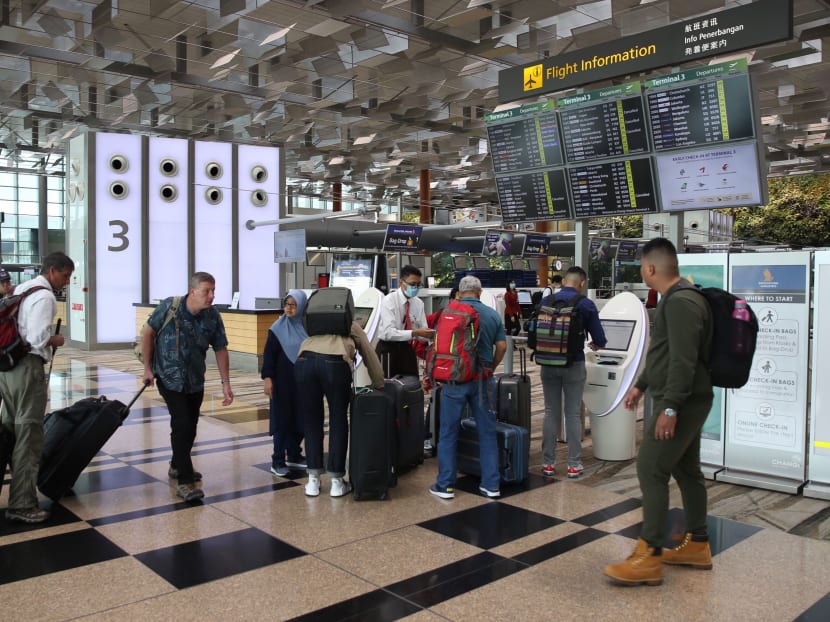Covid-19: Singapore imposes entry ban on new visitors from Italy, France, Spain, Germany
SINGAPORE — Following an increase in imported Covid-19 cases from European countries, Singapore will deny entry to new visitors who have been to Italy, France, Spain and Germany in the last two weeks, said the Ministry of Health (MOH) on Friday (March 13).

All travellers who show symptoms of fever or respiratory illness and who thus have to undergo a Covid-19 swab test at Singapore’s checkpoints will also have to serve a 14-day stay-home notice.
SINGAPORE — Following an increase in imported Covid-19 cases from European countries, Singapore will deny entry to new visitors who have been to Italy, France, Spain and Germany in the last two weeks, said the Ministry of Health (MOH) on Friday (March 13).
From 11.59pm on Sunday, such visitors will also not be allowed to transit through Singapore, the ministry added.
Singaporeans are also advised to defer all non-essential travel to the four countries as they have seen “very high numbers of cases and very high rates of increase”, MOH said in a statement.
And with immediate effect, all travellers who show symptoms of fever or respiratory illness and who thus have to undergo a Covid-19 swab test at Singapore’s checkpoints will have to serve a 14-day stay-home notice, during which time they cannot leave their place of residence at all.
They will have to serve the stay-home notice in full even if the result of the swab test is negative, MOH said.
From 11.59 pm on Sunday, Singaporeans, permanent residents and long-term pass holders with travel history to the four countries within the last 14 days will be issued with a stay-home notice. Those issued the notice will have to stay home at all times for 14 days after returning to Singapore.
Singapore will also cease port calls for all cruise vessels with immediate effect, the ministry added.
The latest round of stepped up border controls comes after the World Health Organization (WHO) declared Covid-19 a pandemic on Wednesday, as the coronavirus has infected more than 125,000 people in 118 countries, and killed more than 4,000.
WHO's chief Tedros Adhanom Ghebreyesus said at a news conference in Geneva, Switzerland that in the last two weeks alone, cases outside China have increased 13-fold and the number of affected countries has tripled.
MOH said that as of March 12, almost 25 per cent of the confirmed cases in Singapore were imported.
In the last 10 days alone, there have been 23 imported cases, making up nearly a third of all new cases, including 13 people with travel history to European countries and six from Indonesia.
Speaking at a media briefing on Friday, National Development Minister Lawrence Wong said: “We've said before that as we get further into the epidemic and as it becomes a global pandemic, increasingly border control measures may become less effective because we cannot identify specific countries.
“But at this stage of the epidemic, we still see very high numbers and rapid increases in a few specific countries, especially in Europe. We are also seeing more imported cases recently, and that's why we think there is still a need to tighten border measures… in order to limit imported cases in Singapore.”
He added that Singapore needs more “rigorous surveillance at our borders”.
“Beyond specific countries, both previous and new ones we introduce today… (we are) concerned about countries with few reported cases of the virus.
Mr Wong said these include neighbouring countries such as Indonesia, from which Singapore has had six imported cases, and Malaysia, where two Singaporeans attended a recent event and were diagnosed with Covid-19 after their return.
Also speaking at the briefing, Health Minister Gan Kim Yong added that two days ago, Singapore saw its highest number of imported cases since the outbreak began.
“Control measures remain important to lower the risk of imported cases, (but) even as we continue to tighten border control, we know it would not be tenable for us to close borders to every affected country and region, and shut ourselves out,” he added.
“We need to ensure measures are sustainable in the long term and life can go on.”
Asked if the border restrictions were prompted by the move by the United States to ban travellers from European countries, Mr Wong said: “Our measures, social distancing or travel restrictions, are informed by data, evidence and expert advice, not based on what other countries are doing.”
He added: “How long can we go on with this? We know what our limits are. If infection spreads at a rapid rate all over the world, continuing on this path would effectively shut Singapore out from the world and we don’t want to get there.”
Mr Wong said that at some point, Singapore would want to shift to a different approach for border surveillance.
“If indeed we are moving in that direction, there will be a limit to how many countries we impose travel restrictions on and we will need a different way of doing border surveillance.”
MOH also issued a list of countries and regions with known and potential exported cases, and is advising Singaporeans to exercise caution when travelling to these places.
Mainland China
Egypt
France
Germany
Hong Kong
India
Italy
Indonesia
Iran
Israel
Japan
Malaysia
Philippines
Republic of Korea
Spain
Thailand
United Kingdom
United States











